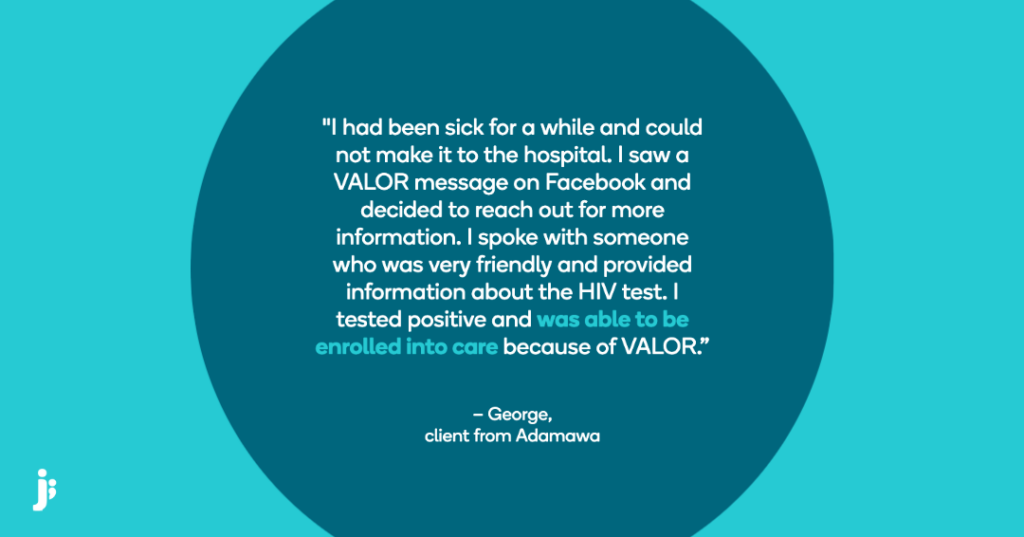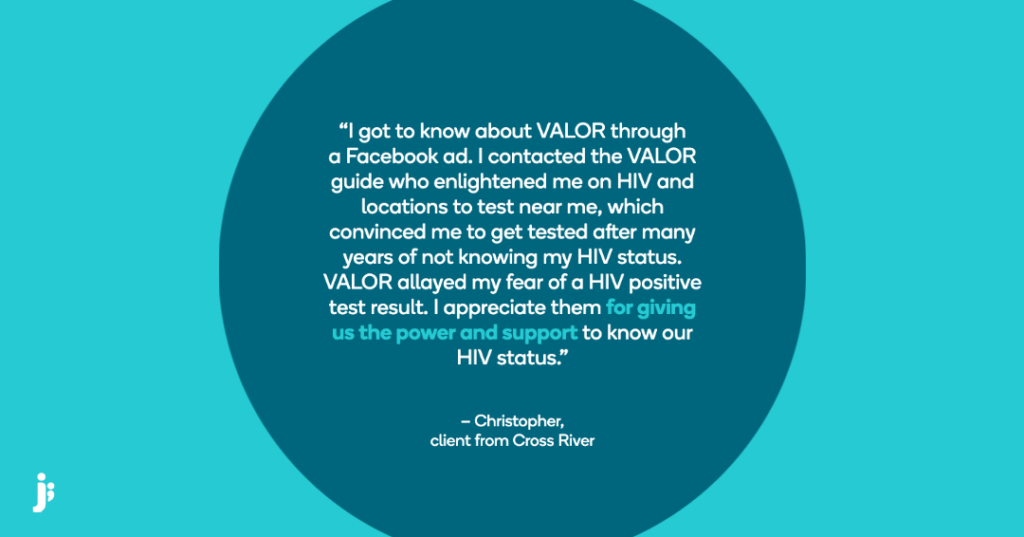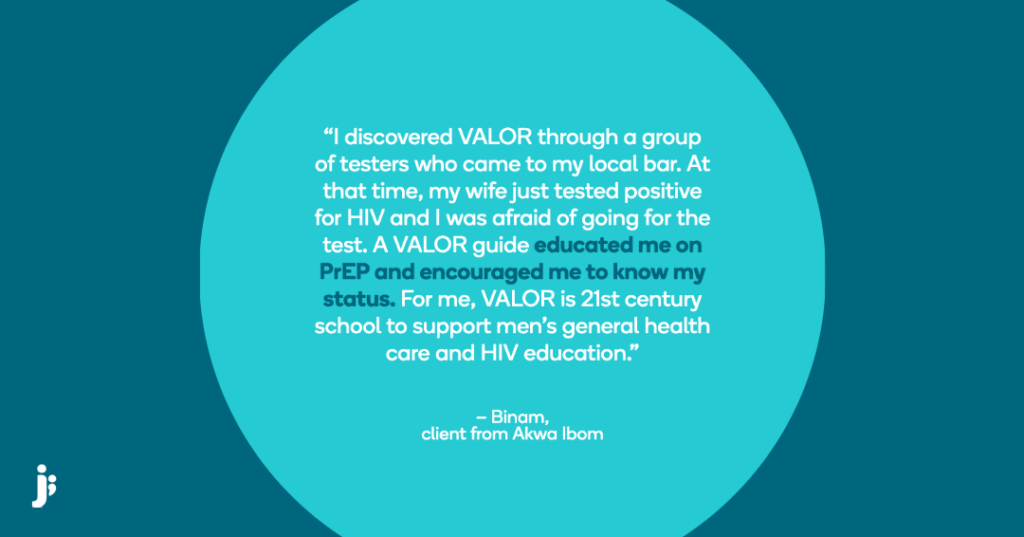Reaching men with HIV prevention and treatment services remains a pressing priority in the global HIV epidemic response, but messaging to men can be tricky. In Nigeria, a social media campaign emphasizing the courage it takes to know your HIV status has resonated, increasing men’s participation in HIV screening and treatment.

The campaign, called VALOR (Virtually Accelerating Linkage of Men to Reframed HIV Services), is an initiative of the Reaching Impact, Saturation, and Epidemic Control (RISE) project, funded by the U.S. President’s Emergency Plan for AIDS Relief (PEPFAR) through the U.S. Agency for International Development. RISE, which operates across three continents, works with countries to achieve and maintain the primary prevention and 95-95-95 goals that are critical to HIV epidemic control.
The VALOR campaign is among many innovative program designs recently highlighted by Jhpiego Stars, an organization-wide competition. Out of 34 entries showcasing examples of social and behavior change, human-centered design and demand-generation innovations, VALOR received a technical award in recognition of its person-centered efforts.
“VALOR was the clear technical winner for the latest Jhpiego Stars competition,” said Nicole Bennett, senior technical advisor for applied design strategy at Jhpiego, who co-led the technical review process for the competition. “They received top scores by all reviewers for application of method, impacts and wow factor. Not only is the branding fresh, but the team developed a new service delivery model using WhatsApp and tracked results throughout. It is an impressive collaboration—and a true Jhpiego Star.”
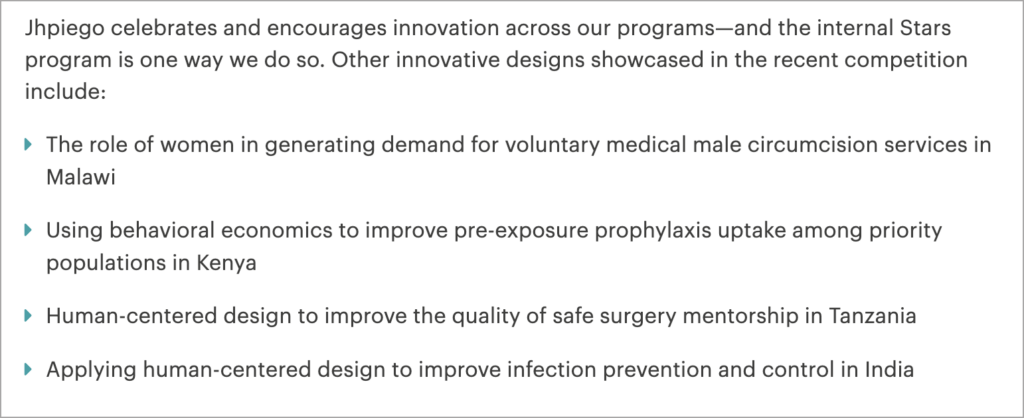
Using human-centered design to find the right message

In 2019, Manya Dotson, Jhpiego’s senior technical advisor for marketing and demand generation, set out to find ways to increase men’s access to HIV testing by understanding what motivated them to get tested. Through a series of human-centered design workshops in Malawi and Zambia, “we realized that so much of the messaging that we create for men has shame hidden inside of it,” said Dotson. “People were telling us that ‘it takes courage to get tested’ because HIV is often portrayed as this scary, catastrophic disease.
“They weren’t getting tested because they didn’t feel like they had the courage to go down the entire path of managing a positive diagnosis,” Dotson added. “So we started thinking about how to break down courage into manageable steps: you just need to find the courage to do the next thing.”
Shortly after the RISE project’s launch in Nigeria, the implementing team saw a clear gap emerging between men’s and women’s use of HIV services. Women’s uptake of treatment and care services was nearly twice that of men, with men lagging behind women across the treatment cascade, see, for example, graph below.
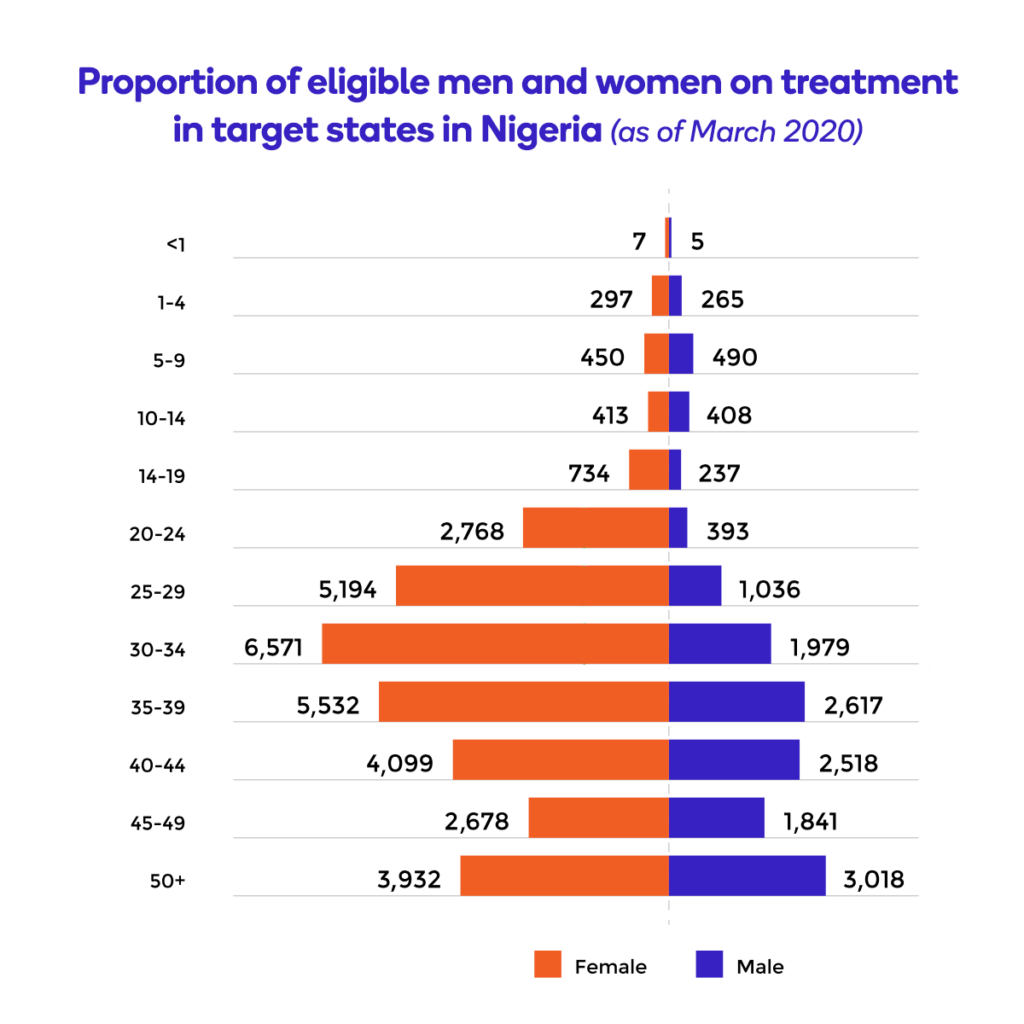
The COVID-19 pandemic made health services such as HIV testing even more difficult to access. With supplemental funds from the U.S. Agency for International Development, the RISE team created a virtual, COVID-19-safe initiative that leveraged technology and social media platforms to link men with HIV services. This approach required precise messaging that would resonate with men, building on what Dotson had heard in Malawi and Zambia. “For men, it is not enough to just increase risk perception and remove barriers,” said Adetosoye Adebanjo, the HIV testing Services (HTS) community advisor for RISE Nigeria. “Men have to desire the service and see how it will help them achieve what they most want.”
RISE put together a team of experts from Mann Global Health, Anova Health Institute and Jhpiego, including Dotson and Adebanjo. The team spent three months undergoing their own all-virtual human-centered design process: holding consultations, mocking up social media posts and organizing WhatsApp focus groups.
“The focus groups consistently preferred and requested tender depictions of support, joy and love, rather than conquering challenges all alone through brute strength,” said Adebanjo.
They wanted to be ‘valorous,’ and they wanted their courage to be celebrated.”
Adetosoye Adebanjo
“Claim your valor.” Strong branding gives credibility
This led to the development of VALOR as the campaign and brand. Through well-designed and targeted Facebook advertisements, men in Akwa Ibom and Cross River State were linked to trained VIP guides on WhatsApp with compelling, confidential, empathetic messages to address their concerns. They created a safe space to learn about improved HIV treatments and prevention interventions, with mechanisms in place for referral to needed services. With the help of partners at the Nigeria-based creative agency Sprout Digital, “the brand became a wish and a promise that they [men] won’t be alone, they can enjoy life and thrive, and that they will keep what matters,” said Adebanjo.
The campaign was a success. Tailoring these insights into RISE counseling strategies improved acceptance of HTS and adherence to treatment. In quarter 1 of fiscal year 22, VALOR ads on Facebook reached 78,923 men, 3,199 men were engaged by a trained guide on WhatsApp, 1,640 were tested for HIV and 170 newly diagnosed with HIV were started on treatment. The VALOR initiative has been incorporated into the ongoing RISE work in Nigeria, and lessons are being shared with other programs.
The VALOR team is optimistic about the scalability of their approach beyond Nigeria and believe bringing it to other countries could lead to more men entering the continuum of care.
“For years, HIV programs have focused interventions on children, adolescents and women,” said Ehi Adejo-Ogirio, a gender technical advisor for Jhpiego in Nigeria and another key member of the VALOR team. “The VALOR approach brings to [the] fore a gender-transformative and human-centered strategy that will ensure men are not left behind in HIV programming.”
“For years, HIV programs have focused interventions on children, adolescents and women. The VALOR approach brings to [the] fore a gender-transformative and human-centered strategy that will ensure men are not left behind in HIV programming.”
Ehi Adejo-Ogirio
Leanne Gray is a senior communications specialist.
About RISE
The RISE project provides HIV prevention, care and treatment in key, priority and general adult populations through strategic technical assistance and direct service delivery in PEPFAR countries. RISE supports countries to achieve and maintain the primary prevention and 95-95-95 goals that are critical to HIV epidemic control. The project will also support PEPFAR’s transition of HIV service delivery to local partners by making transition awards to qualified local implementing partners, advancing progress along the journey to self-reliance.
The RISE consortium, led by Jhpiego, includes ICAP at Columbia University, Management Sciences for Health, Anova Health Institute, BAO Systems, the Johns Hopkins University Center for Public Health and Human Rights and Mann Global Health.




